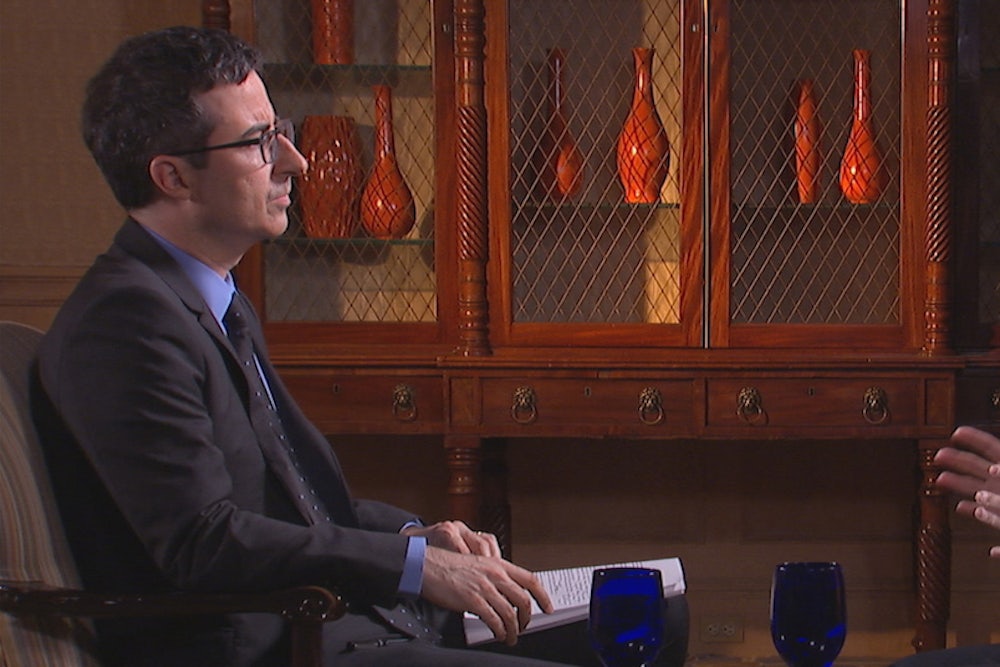Last night’s premiere of “Last Week Tonight with John Oliver” gave little indication that this was the show’s first episode: no personal introduction; no mission statement; no thanking his parents. Oliver’s opening line—“Welcome to … whatever this is”—was the only sign that this was a show still in the process of figuring itself out. That was fitting, because the first outing of Oliver’s HBO series didn’t feel like a show still figuring itself out. For anyone who had seen Oliver’s incredibly successful stint as guest host on “The Daily Show” last summer—or who had seen any episode of “The Daily Show,” period—the new HBO series was astonishingly familiar: “The Daily Show: Sunday Night Edition.”
That’s not exactly a bad thing. Oliver got the job because he is both very, very funny, and a natural at the fake-news format that Jon Stewart perfected over at Comedy Central. I feel a bit peevish criticizing a show that is both hilarious and thoughtful this early in its run—and yet I can’t help feeling disappointed by this new series’ lack of ambition. Unlike "The Daily Show," "The Colbert Report," and "Late Night," Oliver's show airs only once a week—Sunday night at 11 p.m. The schedule puts "Last Week Tonight" at risk of rehashing its competitors' material—last week's news, literally—but it's also an opportunity. Last Thursday, Oliver stopped by “The Daily Show” to boast about the luxuries of HBO. “Oh my god, are you kidding me? Paid cable is amazing,” he told Stewart. “No advertisers—you can do whatever you want.” But with all these resources and freedom, Oliver delivered more of the same. At times, last night’s episode felt like playing a “spot the difference” puzzle. A white, uber-minimalist logo adorned a set that otherwise could have been imported directly from Comedy Central. Oliver can now curse without basic-cable censors bleeping him out. (“Who gives a shit?” was his exasperated comment on 2016 election coverage.) And the most obvious difference: no commercial breaks, letting the show run 30 minutes.
Oliver used that extra time wisely, though, with a long segment on India’s elections that was as much about the actual politics as it was a “Daily Show”-style dig on American media myopia. When he mocked CNN for labeling the Indian election as a “billion votes,” he points out that they’re off by “the population of Brazil.” It was witty, hilarious, and (dare I say it?) educational. The show suffered when it sacrificed that kind of depth for perfunctory quips on the news-cycle, as it did in its first few minutes. Oliver opened by quickly running through a few news items—Donald Sterling, Cliven Bundy, the canonization of two popes—and this was the show at it’s most extraneous. Even with the Sterling controversy, which came to light after the weeknight shows’ had aired, giving Oliver the first crack, his jokes felt obligatory.
Oliver doesn’t need to re-invent the fake-news genre, but he could offer the newsmagazine version: divorced from the news-cycle, idiosyncratic, following Oliver’s own interests and hobby-horses. When Oliver is passionate about a subject, he exhibits an oversized outrage that verges on a goofy hysteria, narrowly avoiding the scolding tone Jon Stewart sometimes falls into. “We should care about this story!” he kept yelling last night when talking about the Indian elections, with an anger that managed to not feel alienating. In his long-running podcast, “The Bugle,” Oliver offers a comedic commentary on political news without the gimmick of a fake newscast; he’s funny, topical, and tough, without relying on a single format for his satire. He’s more famous, in America at least, for his work on “The Daily Show,” but if he wants "Last Week Tonight" to feel less imitative and more essential, he may want to look more to his other old show for cues.
